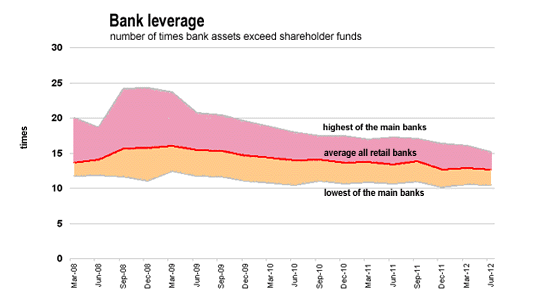By Gareth Vaughan
Leverage at the country's major banks, or the number of times assets exceed shareholder funds, fell in the June quarter as BNZ bolstered its shareholders' funds by NZ$400 million.
The weighted average across ANZ New Zealand, ASB, BNZ, Kiwibank, Rabobank NZ, SBS Bank, TSB Bank, and Westpac NZ fell to 12.7 times capital in the three months to June 30 from 12.9 times capital in the March quarter. That's the equal low since interest.co.nz started monitoring bank leverage in the March 2008 quarter.
Leverage refers to the number of times the total assets of a bank, principally their loans and advances to customers, are larger than total shareholder's funds, including retained earnings, in the bank. See our bank leverage page here.
Across the eight banks ANZ, including the National Bank, again has the lowest ratio at 10.5 times. The highest is Kiwibank's 19.7 times. The big mover is BNZ as it prepares for the Reserve Bank's introduction of new global capital adequacy rules, Basel III, from 2013.
BNZ raised NZ$400 million by issuing 400 million NZ$1 shares to its parent, National Australia Bank in May. Total shareholders' equity in the bank rose NZ$574 million to NZ$5.2 billion with NAB receiving NZ$25 million in dividends for the nine months to June versus NZ$330 million in the same period of the previous year. BNZ's leverage ratio fell to 13.9 times at June 30 from 15.3 times at March 31.

This article was first published in our email for paid subscribers this morning. See here for more details and to subscribe.

We welcome your comments below. If you are not already registered, please register to comment
Remember we welcome robust, respectful and insightful debate. We don't welcome abusive or defamatory comments and will de-register those repeatedly making such comments. Our current comment policy is here.